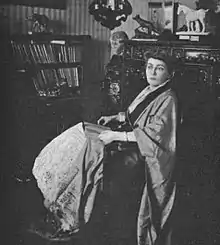Myriam Harry
Myriam Harry was the pen name of Maria Rosette Shapira (April 1869; some sources say 1875 which is wrong – March 10, 1958), a French journalist and writer.[1][2]
Myriam Harry | |
|---|---|
 Myriam Harry in 1904 | |
| Born | Maria Rosette Shapira April 1869 (or 1875) Jerusalem |
| Died | 13 March 1958 |
| Occupation | Writer Journalist |
The daughter of Moses Wilhelm and Anna Magdalena Rosette Shapira (née Jöckel),[1] she was born in Jerusalem. Her father, originally from Ukraine in Czarist Russia and a convert from Judaism to Christianity, committed suicide and the family moved to Berlin. She later moved to Paris.[3] She became secretary to Jules Lemaître.[4] Shapira worked for La Fronde and also wrote several journals in Paris. In 1902, she published her first novel Petites Épouses. Her 1903 work La Conquête de Jérusalem received the first Prix Femina, which was created in 1904 especially for her, since she was excluded from consideration for the Prix Goncourt because she was a woman.[5][3]
In 1904, Shapira married Emile Perrault.[3]
She also wrote accounts of her travels in the Middle East, Africa and Asia.[4] Her reportage of the trial of insurgents accused of murdering French settlers in the Thala-Kasserine Disturbances was instrumental in securing clemency for those sentenced to death.[6][7]
She died in Neuilly-sur-Seine, France.[1]
Selected works[4]
- La Divine chanson (1911)
- La petite fille de Jérusalem (1914)
- Siona chez les Barbares (1918)
- Siona à Paris (1919)
- Le Tendre cantique de Siona (1922)
- Les Amants de Sion (1923)
- La Nuit de Jérusalem (1928)
- La Jérusalem retrouvée (1930)
References
Cécile Chombard Gaudin, "L'Orient dévoilé - Sur les traces de Myriam Harry, biographie", Levallois, Editions Turquoise, 2019
- "Harry, Myriam (1869–1958)". Women in World History: A Biographical Encyclopedia. Archived from the original on 2015-03-29.
- Le Guennec, François (2013). Le Livre des femmes de lettres oubliées. pp. 103–105. ISBN 978-2342004670.(in French)
- Rogers, Juliette M (2007). Career Stories: Belle Epoque Novels of Professional Development. Penn State Press. p. 220. ISBN 978-0271032689.
- "Myriam Harry". Jewish Virtual Library.
- "Prix Femina 1904 : La conquête de Jérusalem de Myriam Harry". Prix Femina website. Retrieved 3 July 2017.
- « Impressions tunisiennes. Autour de l’affaire de Thala-Kasserine », Le Temps, 23 février 1907, p. 3
- Charles-André Julien, « Colons français et Jeunes Tunisiens (1882-1912) », Revue française d’histoire d’outre-mer, vol. 54, No. 194, 1967, p. 96